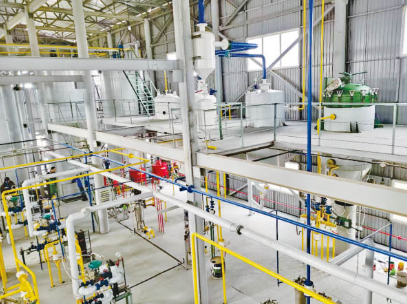China leading palm oil mill plant machine manufacturer and supplier
Email:info01@cnoilmachine.com
Building a palm oil refinery in Indonesia offers advantages such as abundant raw material supply and policy support, but also faces challenges such as inadequate infrastructure and labor risks. The following is a detailed analysis:
Advantages
Abundant Raw Material Supply: Indonesia is the world's largest palm oil producer, with extensive palm plantations, a stable raw material supply, and low transportation costs. For example, East Kalimantan Province is Indonesia's fifth-largest palm oil producing region, and the numerous palm plantations surrounding its Maloy Batuta Special Economic Zone provide a stable source of raw material for refineries.

Strong Policy Support: The Indonesian government prioritizes the development of the palm oil downstream industry chain, and its Special Economic Zone policies offer tax exemptions, investment facilitation, and other preferential policies. For example, the Maloy Batuta Special Economic Zone (MBTK SEZ) provides a favorable policy environment for investors.
Broad Market Demand: Global demand for palm oil and its derivatives continues to rise. Palm oil is used not only in the food industry but also in biofuels, cosmetics, detergents, and other fields. As a major palm oil producer, Indonesia is well-positioned to export its products globally, meeting international market demand. Low Labor Costs: Indonesia boasts abundant labor resources and relatively low labor costs, which can reduce labor costs for refineries.
Challenges
Imperfect Infrastructure: Indonesia's relatively weak infrastructure, including transportation, electricity, and water supply, may impact refinery production and operational efficiency. For example, poor road and communication facilities on some islands can lead to delays in raw material transportation and product distribution.
High Labor Risks: Indonesia's minimum wage increases annually, and labor shortages and strikes are common. Companies must prioritize employee rights and properly manage labor-management relations, which increases management complexity and labor costs.
Policy Stability: Indonesia's policy environment is subject to change, and policy instability can pose risks to companies' investments and operations. For example, adjustments to tax and trade policies can impact refineries' economic profitability.
Complex Regulations: Indonesia's complex legal system and inconsistent enforcement make compliance challenging for companies. Ensuring compliance across all stages of factory construction, production, and operations requires significant effort and cost.
If you are interested in our palm oil machine and palm oil mill plant. You can contact us through online consultation, filling out the form below, email, phone, etc. Our engineers will customize the most suitable plan and best price for you.